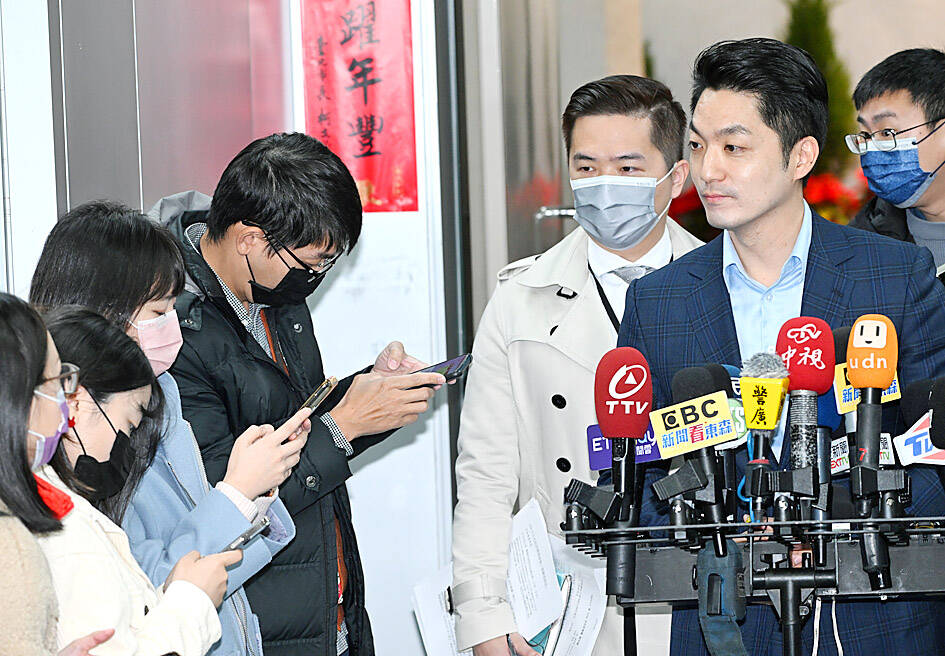The new Taipei City Government would encourage childbirth through bonuses and subsidies, with the goal to push the population in the capital back above 2.5 million, Taipei Mayor Chiang Wan-an (蔣萬安) said yesterday.
Taipei’s population has declined by about 200,000 people in the past few years, which is a shocking number, Chiang told reporters ahead of a municipal administration meeting.
Officials would discuss how to encourage city residents to have children, such as by offering baby bonuses and subsidies, and also by improving social housing policies, Chiang said.

Photo: Tien Su-hua, Taipei Times
The city had to eliminate one deputy mayor after the population dropped below 2.5 million last year, Chiang said, adding that there are about 2.47 million residents today.
Hopefully, the planned policies in combination with overseas Taiwanese returning during the Lunar New Year holiday and restarting their household registration, the population would climb above 2.5 million soon, he said.
The Taipei Department of Civil Affairs said that Taipei’s population is expected to exceed 2.5 million by the end of next month or early March.
While on campaigning ahead of the mayoral election in November, Chiang, in response to population decline in Taipei and a low birthrate nationally, proposed increasing the city administration’s bonus for the birth of a first child to NT$40,000 (US$1,303) from NT$20,000 to encourage parenthood.
Department Commissioner Chen Yung-te (陳永德) yesterday said that the plan to adjust the bonus policy — with plans to provide NT$40,000 for a first child, NT$45,000 for a second child and NT$50,000 for a third or subsequent child — is likely to be implemented after April 4.
However, there are two plans, with one including all babies born after Dec. 25, when Chiang took office, and the other to only include babies born after the policy is implemented, Chen said.
The first plan would cost about NT$530 million more than the second, he said.
A bonus policy would be implemented, but Chiang has not decided on which plan would be adopted, he said.

Beijing could eventually see a full amphibious invasion of Taiwan as the only "prudent" way to bring about unification, the US Department of Defense said in a newly released annual report to Congress. The Pentagon's "Annual Report to Congress: Military and Security Developments Involving the People's Republic of China 2025," was in many ways similar to last year’s report but reorganized the analysis of the options China has to take over Taiwan. Generally, according to the report, Chinese leaders view the People's Liberation Army's (PLA) capabilities for a Taiwan campaign as improving, but they remain uncertain about its readiness to successfully seize

Taiwan is getting a day off on Christmas for the first time in 25 years. The change comes after opposition parties passed a law earlier this year to add or restore five public holidays, including Constitution Day, which falls on today, Dec. 25. The day marks the 1947 adoption of the constitution of the Republic of China, as the government in Taipei is formally known. Back then the Chinese Nationalist Party (KMT) governed China from Nanjing. When the KMT, now an opposition party in Taiwan, passed the legislation on holidays, it said that they would help “commemorate the history of national development.” That

Trips for more than 100,000 international and domestic air travelers could be disrupted as China launches a military exercise around Taiwan today, Taiwan’s Civil Aviation Administration (CAA) said yesterday. The exercise could affect nearly 900 flights scheduled to enter the Taipei Flight Information Region (FIR) during the exercise window, it added. A notice issued by the Chinese Civil Aviation Administration showed there would be seven temporary zones around the Taiwan Strait which would be used for live-fire exercises, lasting from 8am to 6pm today. All aircraft are prohibited from entering during exercise, it says. Taipei FIR has 14 international air routes and

Snow fell on Yushan (Jade Mountain, 玉山) yesterday morning as a continental cold air mass sent temperatures below freezing on Taiwan’s tallest peak, the Central Weather Administration (CWA) said. Snowflakes were seen on Yushan’s north peak from 6:28am to 6:38am, but they did not fully cover the ground and no accumulation was recorded, the CWA said. As of 7:42am, the lowest temperature recorded across Taiwan was minus-5.5°C at Yushan’s Fengkou observatory and minus-4.7°C at the Yushan observatory, CWA data showed. On Hehuanshan (合歡山) in Nantou County, a low of 1.3°C was recorded at 6:39pm, when ice pellets fell at Songsyue Lodge (松雪樓), a